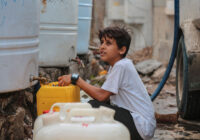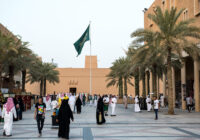The Syrian refugee crisis in Lebanon is just the latest in a sequence of disenfranchisements that have plagued the Middle East for generations. In 1948, just years after Lebanon was founded, the Palestinians were pushed out of their homeland by the Israelis and the Lebanese granted them refuge. Over the years, this was followed by others fleeing persecution and political turmoil.
Refugees Build Bridges Across Society
What is often misunderstood is that 72 years later, some 475,000 Palestinians are still there and living in camps, restricted in their civil rights and upsetting the political comity of Lebanon from time to time, which only deepens suspicion and mistrust among their hosts. Unless they can emigrate to the West or the Gulf, the Palestinians have no place else to go.
The Syrians, on the other hand, have a place to go — it’s right next door. But having fled an ongoing civil war in Syria, they face possible persecution, poverty, forced conscription, displacement, onerous laws for reclaiming their homes and businesses, and a military regime with no compunction to kill its own people if they return.
Lebanon’s Economic Crisis
So, are there any positive stories coming out of the Syrian refugee camps and informal settlements and their host communities in Lebanon? Most would reply that life has only gotten worse this past year as Lebanon is caught between a dysfunctional and depressed economy and the COVID-19 pandemic. Even international donors, facing their own economic and sociopolitical challenges, have cut back their support, and less than half of the $2.6-billion appeal for the national Lebanon Crisis Response Plan was funded in 2019.
In an article for the Atlantic Council, Salman Husain and Diam Abou-Diab write: “Overall, refugees in Lebanon are unable to benefit from international instruments of refugee protection and more than two-thirds of Syrian households lack legal residency due to institutional barriers.” With the collapse of the Lebanese economy, jobs have disappeared, wages are so low for the few available informal jobs and basic living costs have skyrocketed. And, in the last year, host communities have turned against refugees, which has led to mass evictions, restrictions on entry and egress, and unlawful deportations to Syria. Refugees have become a favorite target for some politicians who blame them for Lebanon’s deteriorating quality of life.
“In April, humanitarian agencies found that at least twenty-one Lebanese municipalities introduced additional restrictions on Syrian refugees that weren’t applied to Lebanese citizens,” Husain and Abou-Diab add, which “further restrained people’s ability to access cash or purchase basic goods.” Syrians have become an easy target for those wanting to circulate rumors about the spread of the novel coronavirus — which causes the COVID-19 disease — as the refugee camps have close quarters, little running water and poor sanitation facilities, and medicines are hard to find.
There has been a substantial rise in the price of basic food commodities like sugar and rice. This has rendered a number of once-affordable items inaccessible to the nearly 70% of Syrian households living in poverty, and the number is growing. “The International Rescue Committee, a humanitarian nongovernmental organization, reported that 90% of Syrian refugees they surveyed in April said they are ‘in critical need of food.’ This figure was only 32% in March,” Al-Monitor reports.
Another Day Without Hope
As seen in many countries, the lockdowns caused by the coronavirus pandemic have led to a rise in domestic violence. Husain and Abou-Diab note that, in March, Lebanon saw 100% spike in the number of assault cases against refugees and Lebanese women and girls. They add that “nearly half of Syrian and Lebanese caregivers, recently, reported increased levels of violence against children since the national lockdown caused by COVID-19.” Children are out of school, with no access to remote education, forced out of their tents in refugee camps to find what little employment is available, bearing more scars from their experiences.
While there are many international and local organizations working to improve conditions, funding is in short supply and getting worse. Negotiations between the Lebanese government and the International Monetary Fund will not change the plight of the refugees. Their needs are not included in the government’s financial recovery plan, and IMF assistance is not designated for humanitarian assistance.
With no short-term anticipation of a radical change in Syria that would make a voluntary, safe and supportive return possible, World Refugee Day will turn out to be another day without hope.
*[Jean AbiNader is an international development consultant who writes on the Middle East and North Africa from Washington, DC. This article represents his own opinions and not that of any of his clients.]
The views expressed in this article are the author’s own and do not necessarily reflect Fair Observer’s editorial policy.
Support Fair Observer
We rely on your support for our independence, diversity and quality.
For more than 10 years, Fair Observer has been free, fair and independent. No billionaire owns us, no advertisers control us. We are a reader-supported nonprofit. Unlike many other publications, we keep our content free for readers regardless of where they live or whether they can afford to pay. We have no paywalls and no ads.
In the post-truth era of fake news, echo chambers and filter bubbles, we publish a plurality of perspectives from around the world. Anyone can publish with us, but everyone goes through a rigorous editorial process. So, you get fact-checked, well-reasoned content instead of noise.
We publish 2,500+ voices from 90+ countries. We also conduct education and training programs
on subjects ranging from digital media and journalism to writing and critical thinking. This
doesn’t come cheap. Servers, editors, trainers and web developers cost
money.
Please consider supporting us on a regular basis as a recurring donor or a
sustaining member.
Will you support FO’s journalism?
We rely on your support for our independence, diversity and quality.






